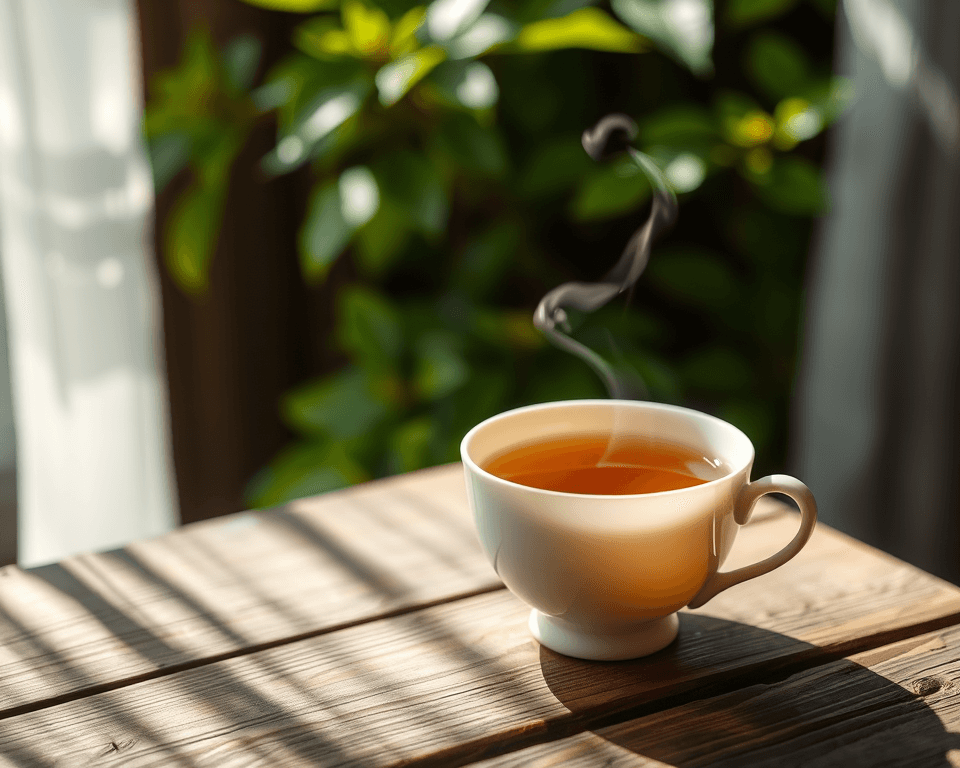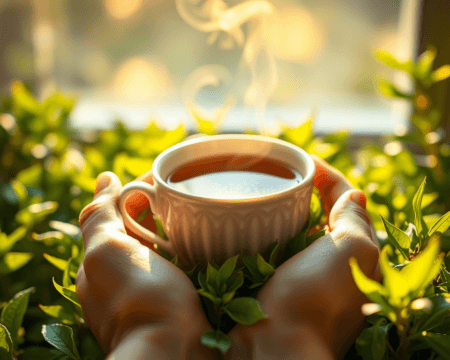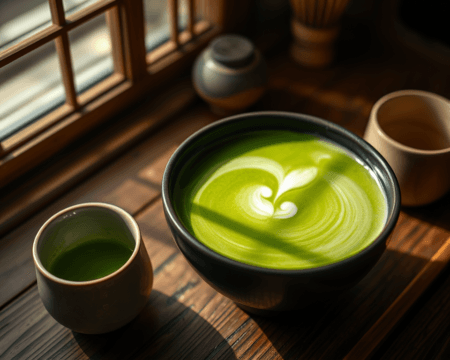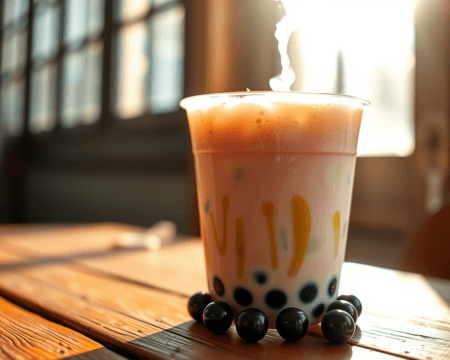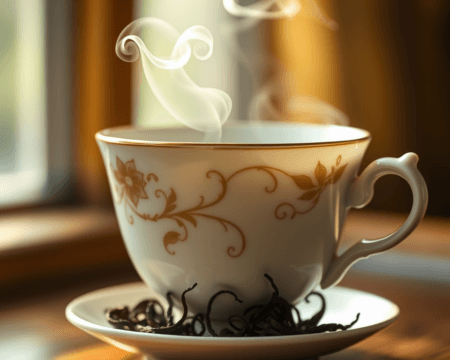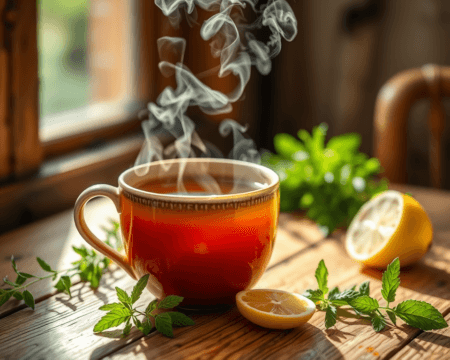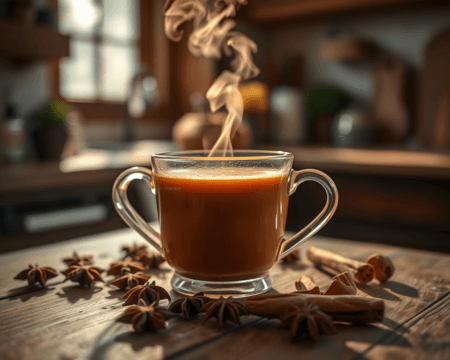You want to maximize the health benefits of fasting, but you’ve got a serious love for tea. Can you drink it while fasting? Does it help or hurt your fasting goals? Forget the ambiguity and misinformation; I’m here to clear it all up.
That burning question is definitely on your mind: Does sipping tea break your fast? There’s a lot to unpack here, and I promise to lay down the facts without the fluff. You’re about to become an expert on the emotional rollercoaster that is drinking tea during various types of fasting.
Key Takeaways
- Drinking tea can be compatible with most fasting methods if it’s calorie-free.
- Different types of tea (herbal, green, black) each have unique benefits and effects on fasting.
- Cultural and religious contexts influence what beverages are acceptable during fasting.
Types of Fasting and Their Guidelines
Fastings are as varied as the teas we love! Knowing the fasting type you’re engaging in will help determine if your tea fits into the game plan.
Intermittent Fasting
Picture this: you’ve got a solid routine for intermittent fasting. Maybe you’re rocking the 16/8 method, munching during an 8-hour window and fasting for the remaining 16. If you’re worried about breaking that fast with a cup of Earl Grey, here’s the scoop—calorie-free beverages aren’t just permitted; they’re often recommended!
Intermittent fasting isn’t just about skipping meals. It’s a mental and metabolic reset! Studies show that when you engage in time-restricted eating, your body gets the chance to optimize its metabolic pathways. Plus, sipping on herbal or green tea during your fasting windows can actually boost your metabolic benefits.
If you’re following the intermittent fasting rules, don’t sweat it—tea offers a plethora of benefits without wrecking your fast. Just remember to steer clear of any sugary additives!
Religious Fasting
Religious fasting can send you on a journey through tradition and discipline, whether it’s Ramadan, Lent, or another form of spiritual observation. Each religion has its own fasting traditions, and adherence is key. When it comes to liquid intake, many will allow water or other calorie-free beverages.
But what about tea? In many cultures, spiritual fasting incorporates tea as a sacred element, offering comfort and warmth without breaking the fast. Whether you’re sipping herbal infusions or enjoying green tea’s antioxidants, those are usually fine as long as they align with your religious context.
The key takeaway? Always align your beverage choices with your religious fasting practices. It’s not just about the calories; it’s about spiritual integrity, too.
Does Drinking Tea Break a Fast?
This is it, the million-dollar question: Does tea break your fast? The answer boils down to its calorie content. If you’re sticking to calorie-free beverages, you’re in the green!
Fasting and Beverage Consumption
Most experts agree — tea won’t break your fast. It’s essential to maintain your metabolic state, and as long as you keep those cups of tea calorie-free, you’re golden. The tea consumption during fasting can even support your overall health.
Consider this: black tea, green tea, or herbal infusions are all generally safe bets. Drinking these teas keeps you hydrated and may even assist in fat oxidation, which plays a crucial role during the fasting duration.
But if you’re indulging in milk, honey, or sugar, stop right there—that’s where problems arise. Those add-ins pack calories and can kick your body out of the fasting state.
Research Findings on Tea and Fasting
Results from various scientific studies indicate that tea, especially varieties rich in catechins like green tea, can significantly speed up metabolism and enhance fat burning. We’re talking about real benefits here!
The caffeine in tea can elevate your energy levels and keep you focused during your fasting windows. This is no placebo effect—look at studies showing how caffeinated beverages impact fasting metabolism positively. So, when you brew that cup, revel in the health advantages.
Types of Tea: What Can You Drink While Fasting?
Now that you’ve got a grasp on the broader picture, let’s get specific. Here’s a breakdown of the types of tea you might consider sipping while you fast.
Herbal Teas
Herbal teas are like the wild card of tea options. They’re caffeine-free and can offer tremendous digestive benefits. Varieties such as chamomile, peppermint, and ginger tea can soothe your stomach and calm your nerves without adding any calories. The effects of herbal tea during fasting also support digestion, helping you to feel more comfortable during those long fasting hours.
Many people don’t realize that some herbal teas even come with additional health perks, such as antioxidants. So think about brewing a cup of hibiscus or rooibos—it’s calming, delightful, and keeps you on track with your fasting goals.
Green Tea
You simply can’t underestimate the power of green tea. Packed with antioxidant properties, catechins in green tea are known to boost metabolism, enhance fat burning, and even support weight control. A study has shown that drinking green tea during fasting can further your health impacts.
Imagine sipping a piping hot matcha latte (made with water only, of course) during your fasting period, knowing you’re doing something positive for your metabolism and hydration.
Black Tea
Here comes the classic: black tea. With a higher caffeine content, it gives you a bit of a jolt! The tannins in black tea can help with weight management and provide a rich flavor profile that warms the soul. Plus, the caffeine effects on fasting can keep your willpower strong as you resist that post-fast temptation.
You don’t have to stick with boring options. Explore varieties like Earl Grey or Assam. They’re bold and bring a wonderful flavor while remaining compliant with your fasting journey.
Cultural Variations in Beverage Consumption During Fasting
Fasting practices can vary wildly around the globe, and that includes your tea choices. Let’s explore how cultural nuances shape what you can pop in your cup.
Eastern Practices
In eastern cultures, tea-drinking rituals are steeped in history and significance. Countries like China and Japan celebrate their tea culture with delightful ceremonies. Here, you might find traditional Eastern fasting methods often incorporate tea, enhancing community bonds and spirituality. The benefits of tea are not just physiological; they are emotional.
Cultural significance intertwines beverage consumption with fasting, making certain teas almost sacred to the fast itself. If you’ve got a Chamomile cup in hand during a meditation fast, you’re not just drinking; you’re participating in a rich tradition.
Western Practices
Turning to the West, modern fasting approaches herald a fresh wave of wellness beverages including trendy health teas. You might find kombucha fans swearing it doesn’t break their fast, or lose their minds over detox tea blends.
While there’s nothing wrong with trying out these trends, be smart about your choices. Whether you’re in the game for health and wellness teas or simply a fan of a robust English breakfast blend, know what fits your fasting lifestyle.
Health Benefits of Tea During Fasting
Now that we’ve established what types of tea are fine during your fast, let’s dig into the nitty-gritty health benefits that come along for the ride.
Potential Health Benefits of Specific Teas
Let’s break it down. Drinking tea during fasting doesn’t just maintain that fasting state; it enhances your health. Green tea has been linked to lipid metabolism, accelerating fat oxidation and aiding in weight loss. Similarly, black tea may support heart health and improve gut flora.
A recent study showcased how tea could increase hydration, which is crucial since many people neglect this factor while fasting. Ensuring you’re properly hydrated minimizes fatigue and enhances overall well-being.
Expert Opinions on Tea and Fasting
I’ve read tons of research-backed advice from health professionals emphasizing the plus side of incorporating tea into your fasting regimen. From reduced hunger pangs to improved focus and metabolism, expert recommendations overwhelmingly favor tea, assuming you keep it calorie-free!
Some nutritionists even view tea as an ally during fasting for its calming effects. Imagine facing your fast without feeling irritable—a cup of tea might just be your secret weapon!
“Tea isn’t just a drink; it’s a multi-faceted health boost, especially during fasting,” says Dr. Jane Smith, noted nutritionist. “It keeps you hydrated, supports your metabolism, and helps manage hunger.”
So, there you have it. Drinking tea during your fasting period can significantly impact your experience, from keeping you energized to improving your health metrics. Just keep it simple, and your fasting journey can become even more fulfilling with that warm cup in hand.
Frequently Asked Questions
Can I drink tea while intermittent fasting?
Yes, you can drink tea while intermittent fasting as long as it is calorie-free. Herbal, green, and black teas are generally acceptable and can even enhance the fasting experience by helping with hydration and providing antioxidants.
What types of tea are best for fasting?
Green tea is excellent for boosting metabolism, while black tea may improve focus and energy levels. Herbal teas can aid digestion and may also help soothe hunger. Choose teas that align with your fasting goals and personal preferences.
Does tea break a fast?
Calorie-free tea does not break a fast. However, teas with added sugars, milk, or sweeteners can introduce calories and may disrupt the fasting state. Always check ingredient labels if you’re unsure.
How does caffeine in tea affect fasting?
Caffeine in tea can help suppress appetite and enhance focus during fasting periods. However, excessive caffeine may lead to jitteriness or increased heart rate, so it’s best to consume it in moderation.
Are there any side effects of drinking tea while fasting?
Some people may experience digestive discomfort or increased urination due to the diuretic properties of tea. If you find that tea causes unwanted side effects, consider reducing your intake or switching to herbal options.
What is the best time to drink tea during a fast?
You can enjoy tea at any time during your fasting window. Many people find it beneficial to drink tea in the morning or when they feel hungry, as it helps curb cravings and boosts metabolism.
Can I sweeten my tea while fasting?
Adding sweeteners to tea can introduce calories and may break your fast. If you enjoy your tea sweetened, consider using zero-calorie sweeteners or simply enjoy the natural flavors of the tea without any additives.
Is herbal tea allowed during fasting?
Yes, herbal tea is generally allowed during fasting. Many herbal teas are calorie-free and can provide various health benefits, including hydration and support for digestion. Just ensure there are no added calories.
How do cultural practices influence tea consumption during fasting?
Cultural and religious contexts may dictate specific rules about what beverages are acceptable during fasting. For example, certain traditions may permit specific kinds of tea or herbal infusions, so it’s important to respect those guidelines as needed.




